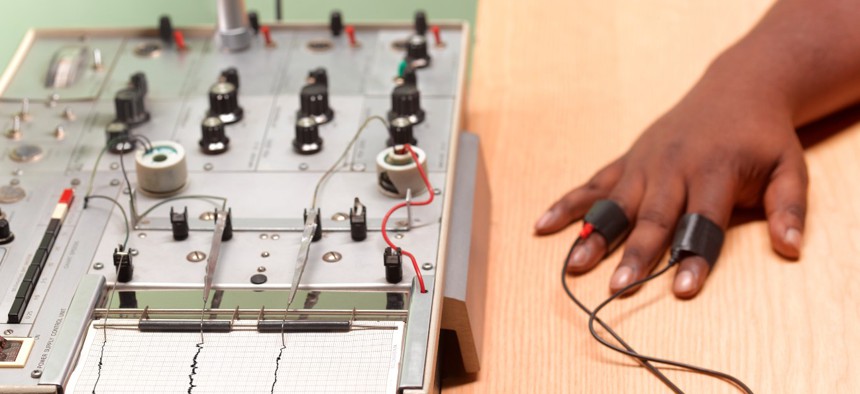
DEA agreed to no longer hire any applicant who fails a polygraph, collect a full review of any employee who previously had failed and ensure that all of those individuals take a new exam for any other position for which they apply within the agency. Peter Dazeley / Getty Images
DEA has regularly hired applicants it flagged as lying on their polygraphs
The agency also faces allegations of nepotism in its lie detector testing and a watchdog is saying the issues require "immediate attention" from management.
The Drug Enforcement Administration has for years violated its own policy of ruling out for employment candidates who fail or cheat on a polygraph examination, according to a watchdog review, which found the agency created potential security risks and the perception of unfair hiring practices.
The DEA has brought on 66 special agents and 11 intelligence research specialists who created a “significant response” during their required pre-employment lie-detector test—the term the agency uses to “indicate deception” during the exam—according to a mid-audit “management alert” sent on Wednesday by the Justice Department’s inspector general. Under a DEA policy established in 2019, any applicant who fails the test is disqualified for three years from the position and any other at the agency requiring a polygraph.
Applicants for certain DEA positions are given two polygraph exams during the hiring process, one for national security and the other for general suitability. Questions relate to past drug use, criminal activities, truthfulness on application materials and other issues. DEA has used polygraphs since 1994, but only started requiring that applicants pass them as a precondition for a job offer in 2019.
Human resources personnel for the agency told the auditors the 2019 policy only applied prospectively and it therefore continued to use the old procedures for any preexisting job posts. The IG found examples of applicants who failed polygraphs in 2020 and were onboarded as recently as 2021 or 2022, but the agency said they were applying to jobs originally posted before the policy change went into effect. The watchdog noted that dating back to at least 2016 DEA told applicants they had to pass screening exams. HR’s reasoning “runs contrary to the DEA job announcements,” the IG said.
The IG also flagged that some employees disclosed legacy applicants related to current or former DEA employees were receiving special treatment with regard to the polygraphs. After the auditors initially informed agency officials about the issue earlier this year, DEA put out new guidance reminding staff to avoid nepotism in hiring. The watchdog said the reminder did not go far enough and DEA officials agreed to update and clarify the agency's nepotism policies.
Polygraphs are used throughout the government, including for any individual seeking at least a top secret security clearance. Their effectiveness has been called into question by many groups and researchers, including the American Psychological Association. The IG said that while the policy remains in effect, it is incumbent upon the agency to enforce it.
“Given the DEA’s determination that the successful passing of a polygraph examination is an important part of the hiring process,” the IG said, “these issues have resulted in potential security risks to DEA operations and the appearance of unfair hiring practices when individuals who have not completed the polygraph process are nonetheless hired by the DEA.”
The watchdog added the issue required "immediate attention" due to the "significant and unmitigated risks" presented by DEA's implementation.
DEA agreed to no longer hire any applicant who fails a polygraph, collect a full review of any employee who previously had failed and ensure that all of those individuals take a new exam for any other position for which they apply within the agency. Still, Michael Ciminelli, DEA’s acting chief compliance officer, disputed the IG’s finding that the agency acted in contrast to its policy. Prior to 2019, he said, DEA made clear that a polygraph would never be a sole factor in rejecting a candidate. When implementing the change, he added, agency officials explicitly stated that it would not apply retroactively.
“DEA has consistently followed the policy established in 2019 since its inception and will continue to do so,” Ciminelli said.







